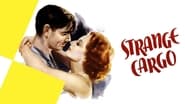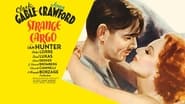Alex da Silva
Clark Gable (Verne) is a prisoner on Devil's Island who has a track record for making escapes. And getting caught. Joan Crawford (Julie) is a singer in a bar on the Island. We are not told why she has ended up here but we can guess that she has had a wicked past. When Gable is found in her room she is expelled from the island and told to leave by the same way that she entered, meaning illegally through the jungle. She becomes a fugitive along with Gable and a handful of other prisoners as they make an escape attempt. Meanwhile the Prison Commandant Frederick Worlock (Grideau) awaits them at the port on the mainland that they are heading to, along with slimy Peter Lorre (Pig) whose ulterior motive involves shacking up with an uninterested Crawford.It's an interesting film that concentrates on a set of prisoners whose strange cargo comes in the form of prisoner Ian Hunter (Cambreau). He is the all-knowing morality man who allows each prisoner to look at themselves and make their peace before heading to their destinies. He appears from nowhere and has a Christ-like drowning scene at the end of the film where he hangs on to a cross in stormy waters.At work, we used to have a post messenger called 'Verne' who delivered files to our desks twice a day. He used to turn up on our floor and throw them at you, believing that was an acceptable way to carry out his duty. He'd just fling them at you and if they missed or hit the floor, so be it. Well, the way that Gable's portrayal of his character 'Verne' delivers his dialogue is just as brash. He just throws it at you. I didn't find him particularly likable. Gable plays it very macho and spouts a lot of dialogue with the use of the word "baby" stuck on at the end when he addresses Crawford. Crawford wins the acting award as she provides her character with some depth and you do wonder as to why she has ended up on the island. There seems to be more to her character, whereas Gable is just a meat-head. He has a rivalry with Albert Dekker (Moll) for leadership of the escaping group – guess who wins? Unfortunately, Dekker ruins his role by attempting an English accent from nowhere. No-one English speaks like that, Dekker! I think he was trying cockney? For me, the most memorable scene was when murderer Paul Lukas (Hessler) realizes his destiny. I think the film could have been better if it had concentrated on his character and his unwillingness to play by Hunter's rules. As it is, we get a love story playing against this conflict of good versus bad. It makes for a happy Hollywood ending with a morality message, but you've got to give full marks to Lukas. Hunter is just not relevant. Another good scene occurs on a boat to the mainland when Gable has to try the infected water. I would have just refused as it means certain death. How will he get out of that one? Perhaps he'll just keep shouting dialogue in a cocky manner, as he does in a climatic scene with Ian Hunter during a storm. Terrible acting from Gable.Overall, I liked this film as it gives a twist to the story of escaped convicts by throwing in a religious redemption element in the form of Hunter. But, it's a shame we didn't concentrate more on the story of Lukas. At the end, you can decide who really wins. Not many are left with their freedom.
mark.waltz
An all-star cast populates "Strange Cargo", a Josef Von Sternberg like movie made at MGM right before war broke out and a few years before its leading lady, Joan Crawford, departed the studio. Still looking quite attractive without much make-up (if any), Crawford plays an older version of Sadie Thompson ("Rain"), a sinner on Devil's Island who is constantly fighting off the advances of a "rat", M'sieu Pig (Peter Lorre), the most hated man (by prisoners and the warden) on the Island. "You're the one man I'd never get low enough to touch", she tells him. But Clark Gable? Yes, in spite of the fact that he's a prisoner, she can't deny her animal lust towards him. When brutish Moll (Albert Dekker) plans an escape, he keeps Gable from joining him by smashing his head with his shoe; That doesn't keep a movie hero like Gable idle for long, and he makes his own escape. Gable & Crawford end up together, Gable takes over as commander of the escapee's boat, and the other escaped convicts begin to ponder spiritual matters as they face their destiny.This is an extremely enjoyable movie that could have been too preachy if not handled carefully. Not all of the escapees reform or believe in what the truly religious characters are spouting. Ian Hunter's character is truly the most profound, and there will be some debate as to who he is supposed to be in the minds of the original writers. Hunter, in fact, gives the best performance, not too holier than thou, but certainly the most profound. Paul Lukas, the veteran leading man from the early 30's, plays a basically nice but moral-less man who is in prison for marrying women he then poisons. The others (J. Edward Bromberg, Eduardo Ciannelli, John Aldredge) have completely different purposes. As for Peter Lorre, this is one of the most vile characters he has ever played, and no one plays creepy like Lorre.While this is certainly not a great film, it is lavishly produced, but is ultimately defeated by the melodramatic screenplay, a few one-dimensional characters, and a bravado of pretentiousness. The chemistry between Gable and Crawford is as affecting as it was in their first film 10 years before, although he was happily married to Carole Lombard at this time. Crawford is brave in taking on a role that seemed to go out of style before the production code came in (films such as "Safe in Hell", "Panama Flo", "Anybody's Woman"), but Gable's overly manly character is lacking much likability. Betty Compson, a star from the early 30's, has a small role as Crawford's pal at the beginning of the film; Her career consisted of roles much like what Crawford is playing here.
davidfmaas
Paradox and Transformation in Strange Cargo David F. Maas
[email protected] Hawkins, TexasI have been enthralled by the movie Strange Cargo since seeing it as a nine year old boy on television in the middle 1950's. I purchased my own VHS copy of this movie in 1995, at the age of 51, watching it dozens and dozens of times, continually fascinated by the symbolism, the philosophical focus, and the stark adventure of a bold escape from a jungle penal colony controlled by the French off the coast of Guiana. This summer, at the age of 65, I bought a seasoned copy of Richard Sale's novel Not Too Narrow, Not Too Deep from Amazon.com, hoping to peel off a few more layers of meaning.Surprisingly, I concluded that Lawrence Hazard's screenplay was far superior to the Richard Sale novel upon which it was based, having a much tighter allegorical construction. Hazard thoroughly deconstructed the novel but stayed faithful to the philosophical core. The screenplay graphically describes the remarkable transformations or conversions from selfish to altruistic life views of six convicts and a sultry nightclub singer escaping to freedom through a dense tropical forest. The catalyst for their transformations is a mysterious Christ figure named Jean Cambreau (Ian Hunter). The sultry nightclub singer Julie (Joan Crawford), ordered off the island by the warden for fraternizing with the prisoners, falls in love with a thief Andre Verne (Clark Gable) after he reads to her the romantic words of Solomon's Song of Songs. She altruistically plans to resign herself to an unhappy marriage with M'sieu Pig (Peter Lorre), a professional stool pigeon, in order to allow Verne to escape. A ruthless killer Moll (Albert Dekker) altruistically sacrifices his life as he drinks from a cask which has absorbed salt water.Andre Verne, who almost escapes to freedom aboard a fishing boat, endangers his own life saving Cambreau, whom he has moments before attempted to drown. Paradoxically, Verne learns that true liberty or freedom consists not in escaping from law but in acquiescing to the law. Instead of deriving satisfaction from coveting and stealing things—he yielded to a wholesome love relationship and playing by the rules. He learned that when we play by the rules, we have freedom right now. Freedom and contentment is a condition independent from circumstances, a condition originating in the heart or mind.At the end of the movie, Cambreau and the fisherman (played by Victor Varconi) who nearly brought Andre Verne to freedom had a very telling dialogue:Fisherman: He won't be sorry? Cambreau: No fisherman. He won't. Fisherman: And everything will be all right for them someday? Cambreau: Everything is all right—now.
blanche-2
"Strange Cargo" is a 1940 film starring Joan Crawford and Clark Gable that leaves the usual story lines behind - romantic comedy, kept woman, rags to riches - as it weaves an allegorical tale of escaping prisoners and a Christ-like figure who accompanies them. Gable is Andre Verne, a prisoner on Devil's Island who escapes with several other prisoners (Paul Lukas, Albert Dekker, Eduardo Ciannelli, J. Edward Bromberg and John Arledge). During the evening count, he's almost found missing but another man, Cambreau (Ian Hunter) replaces him in line. He then boards the boat to the mainland with them and Julie (Crawford), probably a prostitute, who is escaping also from a lecherous bounty hunter (Peter Lorre).The prisoners fall on hard times as they escape through the woods and also while at sea when their water becomes tainted. Cambreau gives each prisoner comfort and helps them to confront the evil that brought them to Devil's Island, helping to bring them peace at last. This is not lost on Julie who sees a chance for redemption. Verne, however, isn't interested.This is a very simple story beautifully directed by Borzage. The atmosphere of the film is dark and haunting. There is no preachiness. The sheer power of Cambreau and his sense of faith is what brings the prisoners solace. Hunter is majestic in the role. Gable is appropriately tough, and Crawford brings depth to Julie, who thought she knew what she wanted. The rest of the cast is top-notch."Strange Cargo" seems like a film that was made in the early '30s with its Christian parable. This was the last film that Crawford and Gable made together. Its powerful message makes this a fitting ending for a fine MGM team.




